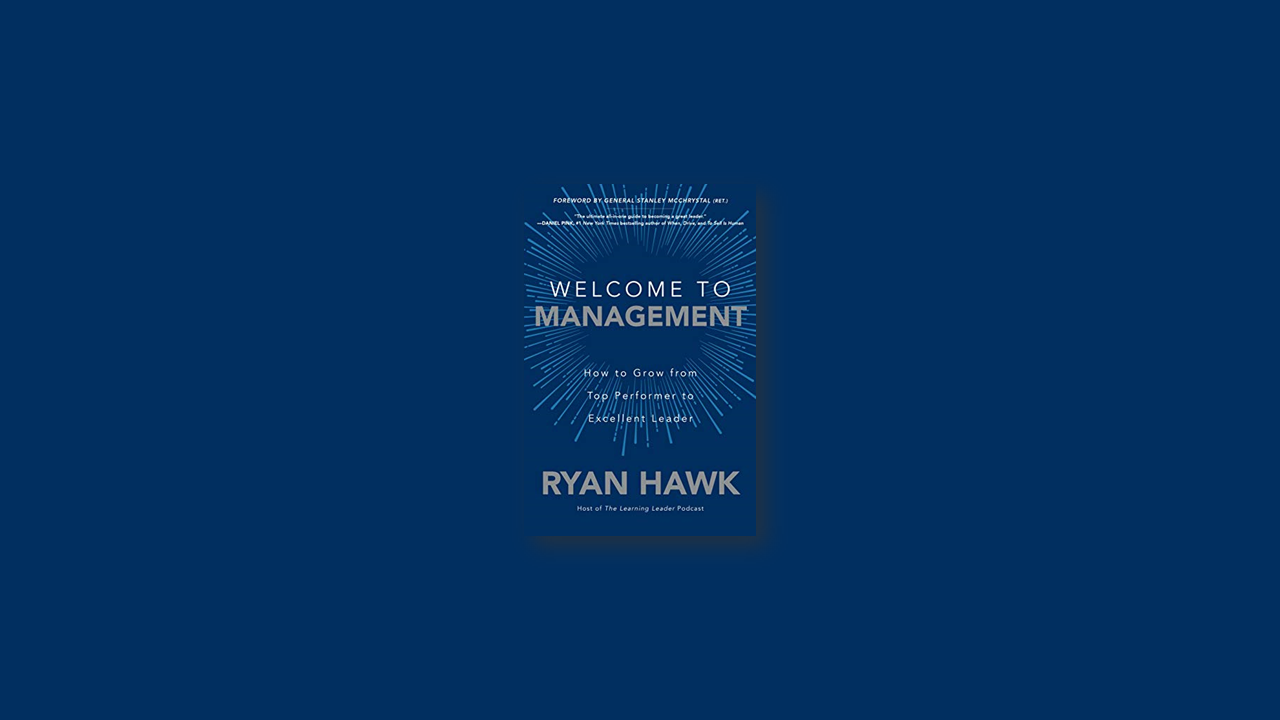Every year, millions of top performers are promoted to management-level jobs―only to discover that the tactics that got them promoted are not the tactics that will make them effective in their new role. In Welcome to Management, Ryan Hawk provides practical, actionable advice and tools designed to ensure that transition is a successful one.
Lead yourself on the inside.
Before we expect to lead others, we must first learn to lead ourselves. We must consistently model the desired behaviors and values for the team to earn credibility as a leader. If you’re not a formal leader yet, build the skills to be the leader, not to get the leadership title.
“Self-discipline matters greatly. Consistently showing you’re willing to get your hands dirty grant you permission to ask others to do similarly hard things with credibility.”
Be always learning.
You’ve been a team member before, and now because you’re given a formal leadership position doesn’t mean you have the license to stop learning. Become a learning machine for yourself if you want your team to be constant learners. Curiosity is the high-octane fuel that propels your growth.
Reflect and teach.
The framework for continuous learning is consume, test, reflect and teach. The highest-perfomring leaders in the world reflect on themselves and their crafts every day. And by teaching what they learnt to their teams, they create an opportunity to learn twice.
“Don’t let your now become your ceiling. Becoming is better than being.”
Work on your mental toughness.
Mental toughness is like your muscles. You can use it or lose it. Seek discomfort to stretch beyond your norms. It’s not the problems that hurt you. It’s you who hurt yourself. It’s how you choose to respond to the problems that makes all the difference.
Carve out time for deep work.
Block out your time into large chunks so you can get into ‘deep work’. Deep work enhances your ability to focus without being constantly distracted on a cognitively demanding task. Consolidate as much ‘shallow work’ as possible into ‘deep work’.
Develop the habit of planning and preparation.
Proper preparation prevents poor performance. Preparation and planning are the greatest medicine for combating fear.
Win in the morning.
Create your morning routine. Start each day with a sense of accomplishment, even if it’s as little as making your bed. Experiment for yourself what works and adjust according for optimal routine. If you’re not sure where to start, check out Miracle Morning by Hal Elrod.
Be willing to be vulnerable.
According to Ryan, the three pillars of high-performing culture are trust, vulnerability and ownership. And he says the quickest way to build trust is to share your vulnerabilities.
You don’t need to teach every time as a leader. Sometimes, it’s better to learn with your team by empowering your high performers to lead training sessions.
Delegate effectively.
Good delegation doesn’t just take the weight off your shoulders so you can focus on high-priority areas, it also accelerates your team performance and individual development.
Get the right people onboard.
The most important decision you’ll make as a manager is about who gets to be on your team. There’s nothing you can do that’s more important than talking the time and effort to hire the right people. Today almost all candidates come prepared for basic interview questions. You’ll learn much more about them with follow-up questions like “Why?” “Then what happened? “What did you learn from that?”
Feedback is the best gift you can give freely.
On day one as a manager, let your team know that your goal is to help them achieve their best performance and all the positives that go with that. Paint the picture of how you’ll be giving feedback, so there are no surprises in performance reviews. Don’t think your feedback is only for low performers. High performers want it too and will seek it out.
Master the art of communication.
Communication isn’t just about getting your ideas across. Communication is about building deep and personal relationships, expressing emotions, sharing ideas and working together to accomplish something we cannot do on our own. Learn to use stories in communication. Stories make information more personal and memorable.
Don’t procrastinate to address difficult situations.
It doesn’t pay to sit and watch the frog, if you have to eat it anyway. Bad news never gets better with age, so there’s no benefit in leaning back and waiting for the issue to resolve itself.
Be purposeful with meetings.
Build the tradition of asking questions before scheduling a meeting. “Why are we having this meeting?” “Is it necessary” “What’s the goal of the meeting?” “Who needs to be in the room?” “When is the best time?”
Manage change and constraints.
Part of your job as a manager is to facilitate change, alleviate uncertainty and figure out how to work with current constraints of the system you’re in. These are the attributes that make the manager worth following.
Do a postmortem, after-action review (AAR) after every project. Learning from success is equally important as learning from failure.
Getting results isn’t enough. You need to ‘why’ behind your results, so you can repeat the success or avoid the failure.
Managing isn’t about yourself.
Your success as a manager will only follow the success of your team. Thinking less of yourself frees you to perform without the desire to impress, be right and get ahead. In this state of mind, managing is a service to help other people be successful.

